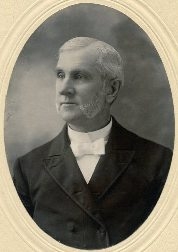It always seems to be a staple of movies set during any war – the last minute wedding of soldier before his unit goes off to war. The Civil War would be no different, I would guess, but it isn’t often that you come across stories of them happening. One of the things I like most about Google is the ability to look through their digitized news archives and look for long-lost stories about the 17th Connecticut. During one of those searches I came across an account from 1912. The event was the fiftieth wedding anniversary of Rev. and Mrs. Horace Q. Judd.
In 1862 Judd was a 21-year old native of Bethel, Connecticut. He enlisted in the 17th CVI on August 13, 1862 and was mustered-in two weeks later as a corporal in Company G. The marriage referenced by Beecher occurred on August 31, 1862. During his service with the 17th Judd was captured on July 1, 1863 at Gettysburg and somewhere on the march south he managed to escape his captors. He was transferred a year later to the Veterans Reserve Corps, where he finished the war as a member of the 159th Company, 2nd Battalion. After the war he became a Methodist minister, serving in various area congregations.
What follows is a story from the Tecumseh News, of Tecumseh, Michigan dated October 8, 1912:
Wedded by Beecher
Wartime Romance Recalled by 50th Anniversary
Hasty Marriage of Divinity Student Makes Deep Impression on Famous Preacher – Makes It Subject of Article
Danbury,Conn.– A wartime marriage, performed by Henry Ward Beecher, then pastor of Plymouth Church, Brooklyn, while making a visit to Washington, Conn., was recalled by the celebration of the fiftieth anniversary of the wedding of the Rev. and Mrs. Horace Q. Judd, at their home in Bethel.
Mr. Judd, a retired minister of the New York East Methodist Conference, was a young divinity student at the time of his marriage, and had just enlisted for the war. His bride was Miss Ellen E. Crofut, of New Preston. The wedding was decided upon the day before Mr. Judd’s regiment, the 17th Connecticut Volunteers, was to march away to the war, and the youthful soldier and his bride hastened to Washington, the nearest village to Miss Crofut’s home, to find a minister.
Mr. Beecher learned of their errand and performed the ceremony. The incident so impressed the famous preacher that he made it the subject of an article in the “New York Independent” soon afterward, in which he wrote:
It was Sabbath evening, calm, soft, clear, sweet breathed, as if there had never been a sin or a sigh among these lovely hills. We wandered down to Mr. Gunn’s school to find a boy of our liking, when lo! Posthaste, came messengers, a wedding! A young soldier just going to the war meant to give his girl the right to come to him, should he be sick or wounded. Tomorrow he leaves. Tonight they must be married. To Mr. Frank Brinsmade’s we posted.
How came it to be there? The young volunteer had got his “certificate” of the town clerk, and he had stepped across the street and told our friend that the brave soldier was hunting for a minister. Just then, in stout, coarse soldier’s blue, came the man, and his flower by his side.
By one of those generous sympathies that seize good people, out ran a noble woman to invite them to stop and be married there, and as several connected families were gathered there for an evening’s singing, there were a score of maidens to greet the bride, and many men to welcome the bridegroom.
Not one of them had ever seen the parties or knew aught of them. It was enough that the man was going to fight for the old flag. We looked in their faces and were satisfied. The rooms were thronged. The service proceeded and closed. Then some one, unbidden, but moved to do it, began to sing, “Guide Me, O, Thou Great Jehovah;” all joined. Then “America” and the “Star Spangled Banner” were added.
Flowers were brought in for the young wife – white day-lillies and geranium leaves. Little remembrances were sought out for the guests, and an enthusiasm of kindness filled the house. Thus two strangers, at twilight, came riding into town, in order that on the morrow, he going to the war, she might have a right to wear his name.
They were stopped, caught out of their vehicle, borne into a refined home, surrounded by loving hearts, all delicately offering their service and making them welcome, and giving them a wedding that, for glow and joy and gladness, few even of those most favored can give their children. As the young husband and wife were leaving, all gathered around the dooryard gate and sang a parting hymn.

